What is the Key to an Extraordinary Life?
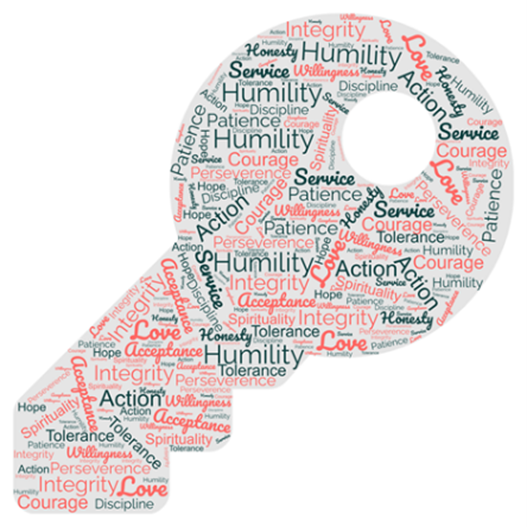
If you’re a 12-Stepper you know we have a Program and ‘it works if we work it’, we have the Steps and we’re encouraged to ‘work the steps with a Sponsor’, we have Meetings and we’re encouraged to ‘don’t use and go to meetings’, we have a Fellowship and we’re encouraged to ‘share our experience, strength & hope with each other’, we have a Spiritual Program of Action and we’re encouraged to ‘seek a spiritual awakening (experience)’, and we believe in a Higher Power and we’re encouraged to ‘find a power greater than our own willpower’.
The 12-Step programs have worked phenomenally well for decades, yet it’s still remarkable when we see a hopeless addict get sober, stay sober, clean up past messes, heal broken relationships, and thrive in their new life of self-directed wellbeing, free from the bondage of their past addictions.
Beyond the components listed above, is there more? Is there an additional key to unlocking a truly powerful, prosperous & self-directed life? Here’s a different way to ask this question: you’ve executed the mechanics of the 12-step program countless times over the years and decades – you actively give back and are tireless in your attempts to help others find their freedom – what additional growth opportunities exist for people who are thousands of days removed from their last drink, drug or acting out behavior?
There’s an aspect of our program that doesn’t get as much attention as it should, and that’s the development of one’s character. We sometimes hear comments like “she has high moral character”, or “he’s always ethical in his business dealings”, or “she has admirable virtues”. Let’s define these terms then I’ll share an example from my own recovery.
- Morals: a person’s standards of behavior or beliefs concerning what is and is not acceptable for them (and others) to do
- Ethics: moral principles that govern a person’s behavior
- Virtues: behaviors showing high moral standards
- Character: the ethical and moral qualities distinctive to an individual or group
With those definitions established as a baseline of understanding, here’s my personal experience with character awareness and development.
Looks Can Be Deceiving
When I first came into the program, I thought I was a pretty good guy who had developed an addiction to drugs and alcohol. Take away the substances and I’d be all good. Turns out, not so much. One of my favorite recovery adages is “take a drunken horse thief and sober him up, and you’ll have a sober horse thief”. Turns out I was a horse thief, and in fact I had three stunning revelations in the first few years of my recovery – first, that I was a hopeless addict and utterly powerless to stop on my own, second, that I’d left a huge path of carnage in my wake during the more than 10 years I used, and third, I was a person of low moral character. By the grace of God and the fellowship of Alcoholics Anonymous (AA), I had a solution to my addiction problem. More, the 12-Step program provided a structured and repeatable means of cleaning up all my messes – relationships, finances, amends and restitutions, fears, resentments, guilt and shame, etc. Even more, the 12-Step program gave me hope for a new future rife with opportunities for health and success not possible when shackled with addictions. Sobriety is what I was given, a clean house is what I achieved, and success is what I was actively creating.
Did one or all of these things make me a good person? Who was I when no one was watching? Did my insides match my outsides? Did I have and practice integrity? Was I honest and have honor? I could talk all day long about humility, integrity, acceptance of myself and others, patience, courage, responsibility, etc. But is that who I really was inside, or was it all lip service so others would respect me and hold me in higher esteem? I was sober, practicing recovery and becoming successful, but had I truly changed or was I still a horse thief on the inside, who had mastered looking good on the outside? Here’s how I was abruptly confronted with these questions and forced to look deep inside, maybe for the first time in my life.

The first few years in recovery went pretty smoothly – I engaged completely in the fellowship and had the support I needed to begin to heal. By that I mean I attended meetings and volunteered to help before and after, I worked the steps rigorously with a sponsor, I gave generously of my time in the aid of others, I studied the Big Book and other recovery materials, I was an active member of a recovery community learning new ways to cope with life’s struggles, and I worked hard to expand my spiritual life. I was deeply grateful for the chance to be sober and for the opportunity to learn to live life without drugs and alcohol. I honestly believed I was growing, maturing and expanding into the new life made possible through recovery; I talked a good game and looked good on the outside. But then…
I remember celebrating 5 years of sobriety, and I wasn’t shy about sharing the achievement with anyone who would listen. Then, a man I greatly admired and respected, a man who had been very good to me – kind, patient, generous – a man in part responsible for getting my life back on track, took me aside, put his arm around my shoulder and gently said “ya know, Steve, I wouldn’t give you a nickel for your sobriety”. This was one of the most difficult moments in my recovery journey; I wanted this man to be proud of me, and for him to see that I was turning his kindness and generosity into something good. I wanted him to say, “I’m glad I invested in Steve’s life”. This caused me to stop dead in my tracks and look very closely at how I was being and behaving – who I really was, inside and out. What I found was arrogance not confidence, cockiness not humility, selfishness not selflessness, dishonesty not honesty, fear not faith, and cowardice not courage; if one of the definitions of integrity is having your insides match your outsides, then it was clear I had none.
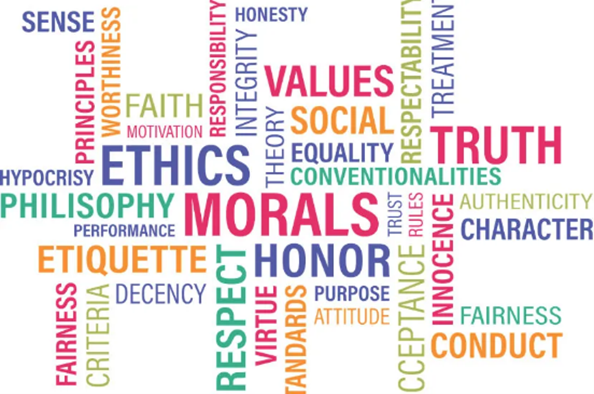
The second 5 years of recovery was dedicated to restarting my life professionally via college and entry-level jobs. But I was also starting to look very closely at my character; in AA we say ‘stick with the winners’, which simply means find the people who have what you want and hang out with them (to be clear, there are no losers in recovery and the saying doesn’t mean some are winners and others are not). I learned this same adage many years later in business – find those who have what you desire and spend as much time with them as you can. There’s a great book titled The Theory of 5 by Chris Saraceno which posits you are the average of the five people with whom you spend the most time, and this is true across the entire span of your life, from childhood family and friends, to your current age and situation. In other words, spend time with those you admire and respect, and distance yourself from those you don’t.
It was incredibly tough facing the truth that I was a person of low moral character, but then it shouldn’t have been a surprise – I grew up without a man (or any adult) to care for me and help me understand who I was and what it meant to be honorable and decent. I had no adult to help guide me through adolescence, correct me when I was wrong, teach me how to say I’m sorry, help me see where I was being selfish or dishonest, and tell me I had value as an individual but needed to learn to be selfless, gentle, humble and generous as part of a larger whole. None of this is an excuse for my behavior and selfishness, but rather a statement of fact that no one taught me I had a character, that it could be virtuous or not, and that it was a conscious personal choice. Virtues are learned – no one is born with a naturally virtuous character.
As with getting sober and cleaning up my messes, AA provided a path forward through this tough period of learning and understanding. In the spirit of ‘stick with the winners’, I sought-out those whose character I admired and wished to emulate, and began learning from them what it meant to be selfless and have honor (defined as doing the right thing regardless the personal cost). A whole new world of possibility appeared as I started to change – I wasn’t just the same Steve now sober, I was becoming a fundamentally different person. You can too – here’s how.
The Path to Fullness & Abundance
The key to living a full and abundant life measured by our ability to be authentic, fully self-expressed, with the freedom to become the very best version of ourselves, and with the ability to create our own opportunities to thrive, is found in the last 7 words of Step-12: “practice these principles in all our affairs”. Each of the 12 Steps has a corresponding virtuous principle which, over time, build moral character. These virtues are acceptance, hope, faith, courage, integrity, patience, humility, willingness, responsibility, honesty, spiritual growth, and service. Rigorous and sustained practice of these virtues over time cements them into the fabric of our being – they become who we are, not just what we do. Good character opens the door to a world of new opportunity! Below is a table showing these virtues aligned with the 12 step principle on the left, and the application of the virtue as expressed in character on the right.
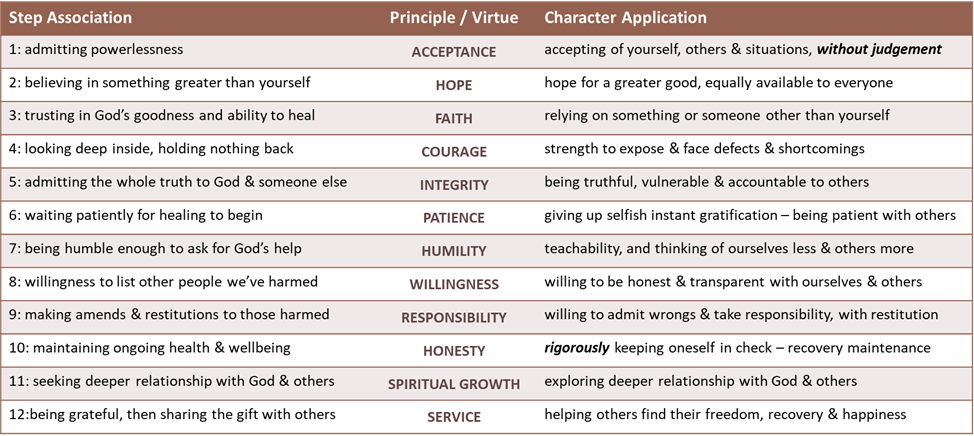
As in most things, the devil’s in the details, and there are myriad different definitions and descriptions for how the virtues align with the steps, and how they show up in one’s character. Think about and apply the definitions and associations that work best for you – there’s no right or wrong answer, only the optimal application of the virtues and principles for your recovery and life. This all sounds great, right? But how do you recognize good character?
Judging a Tree by its Fruit
Above I said good character opens the door to new and more expansive opportunities; let’s look at why that’s true and why good character matters, in your life and in the communities and groups you spend most of your time.
If I had to pick one word to act as the anchor and foundation for why character matters it would be “trust”. Without trust, it’s difficult for anything good to happen between two or more people; trust is the common bond we form when we choose to be in a personal or business relationship with another person. Think about this in your own life – can you name people you don’t trust, around whom you are cautious, and that you would never allow into your inner circle? I think we all can, and we certainly remember people from our past we identify as not being trustworthy or having low moral character. People who deliberately cut corners, falsify results, are selfish and arrogant, blame others, lie, cheat, steal, harm others for personal gain, attempt to hide and deny mistakes, etc. It’s easy to see these untoward traits in others, and we make mental notes to be cautious around them.

Think of the converse – people you trust and with whom you’ve developed mutual trust relationships. With this group, trust flows easily as you’ve already vetted their character and know they’re people you can rely on. What qualities or traits do they possess that makes them trustworthy? How did you come to know you could trust them? How long did it take? People you’ve known for years or even decades are easier to identify because you have history with them – various experiences where they’ve shown up with honor and honesty, admitted mistakes or accepted blame for something they did, and didn’t “throw others under the bus” to make themselves look good or advance a selfish agenda at the expense of others. What about people with whom you don’t have a long history – for instance, people you meet at work and only have a surface-level working relationship – how do you determine who can be trusted and who can’t?
By nature we’re suspicious of one another; we’re all naturally wary when around new people, and especially groups with whom we haven’t previously interacted. We want to feel safe and know that people aren’t out to harm or take advantage of us. Under what conditions do we begin to trust and let our guards down with newer individuals and groups?
There are a number of filters we use when gauging someone’s trustworthiness; we listen to what they say and we watch what they do – do they do what they say they’ll do (honor their word), or do they say one thing but do another? Are they mean-spirited and bullying with their words and behaviors or are they gentle and composed with a sense of calm in their demeanor? Another filter we use is how they treat us, and how they treat others. Are they welcoming and gracious, or are they aloof and stingy? Do their eyes light up when they see you approaching or do you sense a bit of a scowl, making you feel guarded? Maybe most telling is how they treat people in other roles or social strata – are they as kind and engaging with the person serving in the lunch line as they are when an executive walks by? Or do they treat people they perceive as “less than” with rudeness and contempt, like the person is beneath them? These are rudimentary filters we all use naturally to determine how close we’ll get to others and far we’ll allow them into our lives.
One way to describe this vetting process is “judging a tree by its fruit”. Unlike ‘judging a book by its cover’, which forms an opinion (or makes a judgement) after only looking at the surface of something, ‘seeing the fruit a person produces’ is more involved because it not only encompasses their accomplishments, but how they treat others and how they make other people feel. The poet laureate Maya Angelou is famous for saying “I’ve learned that people will forget what you said, people will forget what you did, but people will never forget how you made them feel.” We can and do make snap judgements about people with only surface glimpses (wealth, title, accomplishments, attire, possessions, etc.), but only by seeing deeper into their lives do we secure the information needed to form a trust decision. Let’s consider “the fruit a person produces” idea through the analogy of a fruit tree.
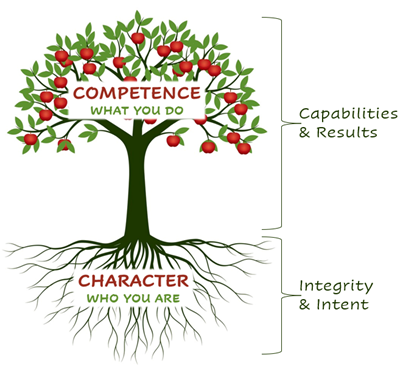
The concept of the Character/Competence tree was lifted from the book The Speed of Trust by Stephen M. R. Covey. I love how it represents your Character as the roots, hidden beneath the surface, and correlates your character with Integrity and Intent. The tree is only as healthy as the root system; healthy root, healthy fruit -|- sick root, sick fruit! In the simplest terms, Integrity represents how honest or dishonest you are, and Intent represents your plans, goals and actions as magnified through the lens of your Integrity.
When asked what qualities he looks for when making a hiring decision, Warren Buffett responded “Intelligence, energy, and integrity. And if they don’t have the last one, don’t even bother with the first two”. Without integrity, everything you do will be seen by others as questionable and suspect, and it will be difficult to establish a working level of trust with anyone. Worse, over time you’ll develop a reputation as someone not to be fully trusted, and that will severely limit how fast and far you can advance individually, as part of a team, and within an organization. Above I showed Character as the composite of your integrity and intent. Character is hidden inside you and expresses who you are as a person. We don’t see character directly – what we see are the results of your character, the fruit your character produces. This shows up as your Competence, manifest as your Capabilities and Results. Below are a few simple examples of “the fruit a person produces” – can you identify which character traits are at play and whether the person attracts or repels trust with others?
- “I love how Gary always finds ways to encourage his teammates when trying to solve difficult problems; he always has something positive to say.”
- “You’d never know Sarah was the Senior Manager unless someone told you her title; she just blends into the group and contributes like the rest of us.”
- “Mark is really smart, but I wish he’d give others a chance to contribute more in our meetings.”
- “The team did an amazing job increasing revenue last month, but Bonnie exaggerated her contribution took credit for our hard work!”
- “That’s the third time someone shared with me that Scott was talking about me behind my back, criticizing my work and telling others I couldn’t be trusted.”
I’m sure you recognize some of these in others; do you recognize any in yourself? Would you be willing to ask someone you trust for feedback on where you might not be showing good character, or where you might improve? Remember, virtues are learned and strengthened through practice.
Why Character Matters
Consider the following statements – can you see why a virtuous character is important?
- Character is Everything – it’s who you are as a person – expressed by your virtues: honest, just, generous, humble, etc. or dishonest, biased, stingy, arrogant, etc.
- Character informs Competence – your capabilities & results flow from your virtues
- Character Cements Reputation – you will be known for who you are more than for what you do
- Character is an Anchor – your values & beliefs are reciprocal with your character and create unshakable confidence in the face of change
- Character Creates Opportunity – the fruit you produce creates trust which opens the door to an abundance of new opportunities to thrive
Let’s go back to the list of character virtues (or traits) associated with the 12 Steps and find their opposites along with how they’re negatively expressed in one’s character.
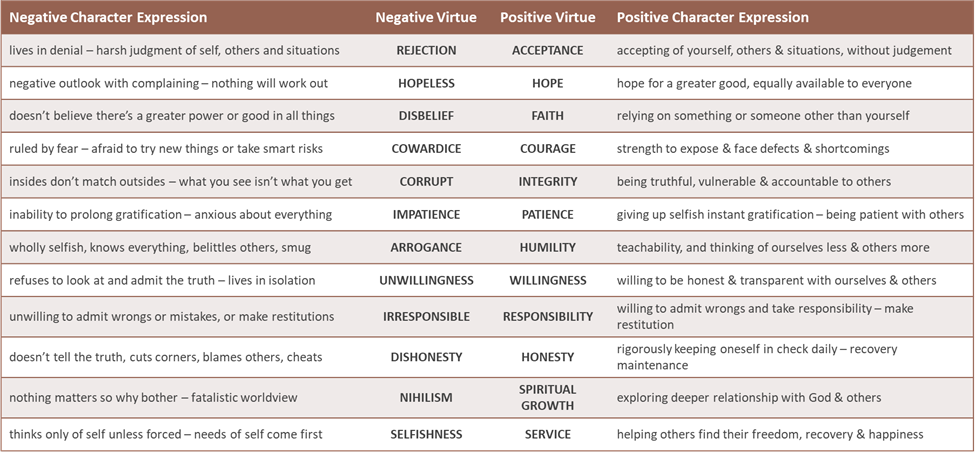
Spend some time comparing and contrasting the two lists along with their associated character traits; do you recognize any of these in your family, friends or people at work? Do you recognize any of these in yourself? Page 84 in the book Alcoholics Anonymous, affectionately referred to as the ‘Big Book’ in the AA program, states the following[1] and is a wonderful example of ‘practicing the principles’:
“Our next function is to grow in understanding and effectiveness. This is not an overnight matter. It should continue for our lifetime. Continue to watch for selfishness, dishonesty, resentment, and fear. When these crop up, we ask God at once to remove them. We discuss them with someone immediately and make amends quickly if we have harmed anyone. Then we resolutely turn our thoughts to someone we can help.”
This paragraph has a number of useful lessons; first, it states our function is to grow in understanding and effectiveness, and that this will continue for the rest of our lives. Second, it warns to watch for selfishness, dishonesty, resentment, and fear, what I jokingly refer to as the Four Horsemen of the Apocalypse, as any one has the potential to knock us off the balance beam of recovery where we stay centered in honesty (not keeping secrets) and serenity (a lack of inner conflict).
Third, it warns “when these crop up”, not “if they crop up”; I’m guessing the author was very deliberate in saying ‘when’ instead of ‘if’. These are natural human emotions and conditions every person faces – people in recovery have no unique claim to these, and there’s nothing spooky or scary here – they’re completely normal; people in recovery simply pay special attention when these come up as they can upset our serenity and lead us back to unhealthy thinking. And finally, the author leads us right back into the heart of our program by suggesting we surrender the condition or emotion to God, share with another person what just happened, and then flush the whole deal by finding someone we can help.
The process described above is an example of “character in action”, as it requires Courage (step-4, take an honest self-appraisal), Integrity (step-5, share honestly with another person), Humility (step-7, ask God for help), Responsibility (step-9, make amends and restitutions), Honesty (step-10, keep a vigilant watch for setbacks) and Service (step-12, using the experience to help another person). This is a simple but powerful example of practicing the principles in all our affairs and I hope you can see that by consistently living into these principles, they become a virtuous part of who we are, so innate to our character that we would feel odd behaving any other way. The old traits and behaviors are still there, and we still do sometimes slip back into old ways of being, but it’s increasingly easy to catch ourselves and take corrective action.
Some of the most honest, decent, generous, kind, humble and honorable people I know are in the program – not because they were born that way, but because our Fellowship provides a path to freedom from our disease, a repeatable mechanism to clean up our messes, and a “design for living” that creates within us a character both honorable and admirable.
[1] https://www.aa.org/sites/default/files/2021-11/en_bigbook_chapt6.pdf
